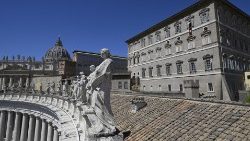Pope at Angelus: Jesus’ disciples are poor and happy
By Devin Watkins
Pope Francis offered a reflection on Sunday’s Gospel reading (Lk 6:20-23) at the midday Angelus prayer with pilgrims in St. Peter’s Square.
Speaking about the Beatitudes, the Pope noted that Jesus was surrounded by a large crowd when he proclaimed them, but that He addressed them to “His disciples”.
Pope Francis said Jesus did so because the Beatitudes “define the identity of the disciple of Jesus.”
“They may sound strange, almost incomprehensible to those who are not disciples,” he admitted. “However, if we ask ourselves what a disciple of Jesus is like, the answer is precisely the Beatitudes.”
Poor, blessed, humble
The Pope focused his attention on “Blessed are you poor, for yours is the Kingdom of Heaven.”
Being poor, said Pope Francis, means Christians find our joy in the gifts we receive daily from God—like life, Creation, and our brothers and sisters—and not in money or other material goods.
This type of poverty, he added, urges us to share the goods we have “according to the logic of God, which is gratuitousness.”
“Therefore,” he said, “the disciple is a humble, open person, far from prejudice and inflexibility.”
Paradox of the Beatitudes
Pope Francis went on to recall last Sunday’s Gospel account of St. Peter casting his net at Jesus’ invitation, before leaving his miraculous catch to follow the Lord.
The Pope said some people may listen to Jesus but ultimately refuse to accept the “paradox of the Beatitudes” and end up dissatisfied and sad.
Freed from chains of rigidity
The Beatitudes, noted the Pope, “declare that those who are poor, who lack many goods and recognize this, are blessed, that is, happy.”
“Disciples know how to question themselves, how to humbly seek God every day, and this allows them to delve into reality, grasping its richness and complexity,” he said.
Christian disciples, said the Pope, allow ourselves to be challenged and are willing to undertake a tiring journey to enter the logic of God.
Joy of Christian disciple
Finally, Pope Francis invited Christians to ask ourselves if we enjoy “the disciple’s readiness” or if we prefer to embrace our own rigid mindsets.
“Do I allow myself to be ‘inwardly unhinged’ by the paradox of the Beatitudes, or do I stay within the confines of my own ideas?” asked the Pope.
He concluded his catechesis with a reminder that joy is the true mark of a disciple of Jesus.
“May Our Lady,” he prayed, “the first disciple of the Lord, help us live as open and joyful disciples.”
Thank you for reading our article. You can keep up-to-date by subscribing to our daily newsletter. Just click here





